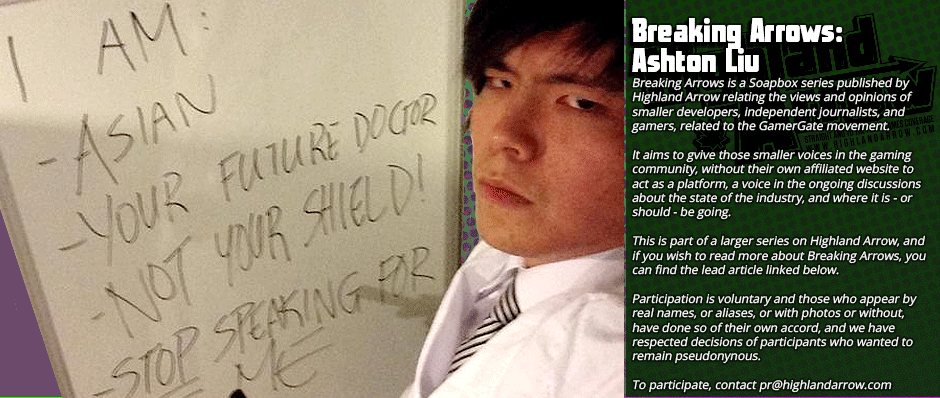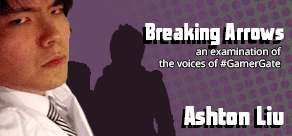Breaking Arrows is a Soapbox series published by Highland Arrow relating the views and opinions of smaller developers, independent journalists, and gamers, related to the GamerGate movement.
This entry in the series is the response of Ashton Liu, a medical professional and a contributing Editor at RPGFan.

Breaking Arrows is a Soapbox series published by Highland Arrow relating the views and opinions of smaller developers, independent journalists, and gamers, related to the GamerGate movement. To read more about it, read the lead article here.
Why is gaming important to you?
To me as an individual, gaming is something that helped me whittle away boredom and kept me company as a kid. I don't play as frequently (or for hours at a time) anymore, but to say that gaming has had a not-insignificant impact on me personally is not an exaggeration.
In general terms, gaming offers an outlet. During my rotations when I was an intern, many sick children that were suffering from illnesses like Leukemia were bored and dreading the future because of their illness. I would bring my video games in during some weekends I was off to play Street Fighter or Pokemon with them, and it could take their minds off of their illnesses and pain for a while. As a medical professional, keeping patients in high spirits is important to the healing process. The gaming sessions might have made a significant difference for these children. It's also an outlet for people who are lonely, depressed, or suffer inwardly but have no other outlet.
What is your relation to gaming?
I have no relation to gaming other than as a hobby and a small role at a video game website writing reviews for free.
What does gaming mean to you personally?
It's a hobby. One that doesn't necessarily have a part in my identity as a person, but is looked upon fondly by me, as is its community at large.
What is your take on the recent controversies? (and old ones, Jeff Gerstmann’s firing, the Doritios/Mountain Dew advertising thing, etc)
We always knew there was money exchanging hands under the table. We tolerated it because at that point, it was a victimless crime. Nobody was really being hurt (outside of certain incidents like Jeff Gerstmann) and all we really had to deal with were extra articles or features which were obviously little more than editorial advertisements - all things considered, a minor annoyance, at best.
What changed for the recent controversy is that people started getting hurt. The mentally ill. The sexually harassed. Feminist startups. Minorities and women who didn't conform to their opinions. One doxxed a minor, I believe, while their friends cheered them on. This while they were claiming ideological superiority and the mantle of "progressivity." It was disgraceful, barbaric, and such a gross breach of not only journalistic ethics but also human morals that the gaming community at large was absolutely revolted when these events came to light. I admit, I haven't worked in medicine for very long, but what I saw here was far and away some of the worst abuses of human civil liberties I had ever seen.
What's worse is that when these incidents became public knowledge, the journalists not only did not apologize, but circled the wagons and attacked us for questioning the ethics of their actions, saying that WE were the monsters, in one of the most egregious attempts at gaslighting I've ever seen in my life. Somehow, because incidents of their wrongdoing were exposed partly due to the indiscretions of a female indie developer (who will remain unnamed), they attempted to defend themselves by claiming that we were harassing her, which was clearly not true (our hastag, #gamergate, was created specifically to separate ourselves from those using the previous hashtag to harass said developer). When we said they had to provide evidence of such a serious allegation, they provided no evidence and accepted their own word as truth to smear us further and publish vicious and outlandish articles smearing us with blanket condemnations regardless of our race, gender, sexuality, relgiious alignment, or any other attribute.
The current method of defaming us is a continuation of that method. They have no evidence that were participated in any such attacks or harassment campaigns, and yet they parrot it as the truth. It is a miscarriage of what journalism should be about.
How you feel gaming can improve in light of these?
In truth, the gaming community has become very diverse and accepting of different viewpoints and characteristics. By contrast, the gaming press is largely homogenized (mostly affluent heterosexual Caucasians with a few token minorities here and there to claim "diversity") and intolerant of viewpoints that don't fall in lock step with their own. I can say that as a minority I have not experienced racism on quite a scale like that I've suffered from the attacks from the gaming press the last few weeks. I've also seen some utterly disgusting misogynist and racist attacks against female and minority GamerGate supporters from the gaming press (one prominent member of the press called a pro-GG woman's vagina a "cave," while another called minorities within the GG community "House Niggers").
My opinion is that the gaming community doesn't need to change. It's already doing so of its own volition. We are already on the way to progress. Conversely, it is the gaming press that needs to change. Their narrow world view needs to be demolished so they can see how dreadfully childish they've been acting, so they can change along with us, rather than resisting progress.
Ashton Liu also blogs about this elsewhere: http://rpgfanashton.tumblr.com/


